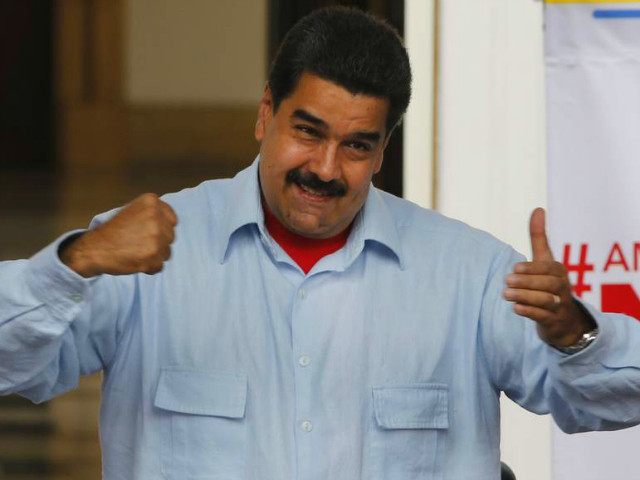Venezuela’s socialist President Nicolás Maduro has decreed that government workers not come to work on Fridays for the next two months to conserve electricity, as the nation battles a drought that has left the nation’s largest dam nearly empty. Maduro also called for women to stop using hair dryers.
“I make a call to the entire nation. I ask for your maximum cooperation to execute this 60-day plan,” Maduro said during his television program in Venezuela Wednesday. Maduro, who also gave the nation the entire Holy Week off as a means to conserve electricity, said the previous experiment had yielded good results. He also made an unusual call to women specifically to conserve energy.
“Diminish the use of hair dryers or use them only for special occasions, and in these 60 days use them at half power. Can you do that, ladies?” he asked.
Maduro alleged that giving government workers Fridays off for two months would help decrease the use of energy by at least 20 percent. Engineering experts have contested that claim, however, suggesting that one day a week of government holiday will do little to help the Guri dam replenish its water supply. Miguel Lara, the former director of the nation’s Interconnected Systems Operation Agency, tells Venezuela’s La Nación that he expects a maximum of ten centimeters of water saved in the dam, which would be a negligible increase in water levels and do little to help the country generate more power.
The call for shortening the work week, in Lara’s eyes, “speaks to the improvising nature of electrical authorities that only seem to seek a media impact to make it appear that the electrical crisis, which affects all of Venezuelan society, is not a consequence of the unprofessional management at Guri.”
The nation’s pro-democracy opposition has openly mocked Maduro for trying to solve the electricity crisis that has plagued the nation throughout his tenure by giving government workers days off. “The geniuses at the presidential palace are increasing days off to resolve the electricity chaos. To really solve the problem, clearly you have to increase them to 365 days a year,” Henry Ramos Allup, the head of the opposition in the National Assembly, tweeted Wednesday. Jesús Torrealba, the executive secretary of the opposition Democratic United Roundtable (MUD) opposition party, described Maduro’s government as a “vagocracia,” or “Lazy-ocracy.”
Henrique Capriles Radonski, the governor of Miranda state who ran against Maduro in a presidential election widely considered to be of questionable legitimacy, attacked Maduro himself as lazy. “Maduro has never worked, so of course it is normal to decree days off. Today he reiterates his inability to govern,” Capriles wrote on Twitter.
Maduro’s failure to stabilize the Venezuelan economic, as well as his imprisonment of political opposition and liberal use of police brutality against opposition protesters, gave the opposition MUD party the first non-socialist majority in the Venezuelan legislature in 17 years in December. The legislature now seeks to oust him. They have announced that they will pursue three strategies to get Maduro out of his office: A recall referendum, a constitutional amendment to get him out, and the mobilization of protesters on the street.
The opposition is making this move as momentum builds in Venezuela’s left to remove Maduro, as well. A number of prominent Chavistas have begun to openly question his leadership, and reports have surfaced that socialist legislators and party leaders have evaluated the possibility of replacing Maduro with a more popular and adept leader. In addition to those Chavistas who view him as incompetent, there is a growing call for an investigation into the Maduro administration’s alleged corruption. Three former members of Hugo Chávez’s government alleged that $300 million had gone missing from the state-run oil corporation earlier this year, demanding answers.
Protests against Maduro have also turned violent once again in Venezuela. In western Táchira state last week, student protesters stole a public transportation bus and drove it through a crowd of police, killing two. The incident was captured on video.

COMMENTS
Please let us know if you're having issues with commenting.